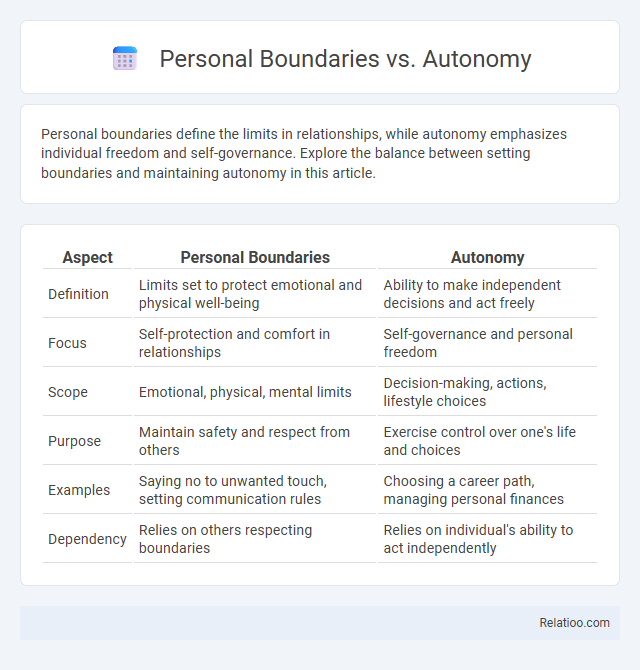Personal boundaries define the limits in relationships, while autonomy emphasizes individual freedom and self-governance. Explore the balance between setting boundaries and maintaining autonomy in this article.
Table of Comparison
| Aspect | Personal Boundaries | Autonomy |
|---|---|---|
| Definition | Limits set to protect emotional and physical well-being | Ability to make independent decisions and act freely |
| Focus | Self-protection and comfort in relationships | Self-governance and personal freedom |
| Scope | Emotional, physical, mental limits | Decision-making, actions, lifestyle choices |
| Purpose | Maintain safety and respect from others | Exercise control over one's life and choices |
| Examples | Saying no to unwanted touch, setting communication rules | Choosing a career path, managing personal finances |
| Dependency | Relies on others respecting boundaries | Relies on individual's ability to act independently |
Introduction: Defining Personal Boundaries and Autonomy
Personal boundaries refer to the physical, emotional, and mental limits individuals set to protect their well-being and define their sense of self in relationships. Autonomy involves the capacity to make independent decisions and govern one's own life without external control or influence. Understanding the distinction between personal boundaries and autonomy is crucial for fostering healthy interactions while respecting individual freedom.
The Core Differences Between Boundaries and Autonomy
Personal boundaries define the limits and rules individuals set to protect their emotional and physical space, while autonomy refers to the capacity to make independent decisions and control one's own life. Boundaries function as protective barriers that regulate how others interact with you, preserving your well-being and personal values. Autonomy, on the other hand, emphasizes self-governance, highlighting the freedom to act according to personal beliefs and preferences without external control.
Psychological Foundations of Personal Boundaries
Personal boundaries are psychological frameworks that define an individual's limits in relationships, preserving mental well-being by distinguishing self from others. Autonomy represents the capacity for self-governance and independent decision-making, rooted in cognitive development and emotional regulation. The psychological foundations of personal boundaries involve self-awareness, emotional intelligence, and the integration of autonomy to maintain healthy interpersonal dynamics and personal identity.
Exploring the Concept of Autonomy
Autonomy refers to an individual's capacity to make independent decisions and govern their own actions without external control, emphasizing self-determination and personal agency. Unlike personal boundaries, which establish limits to protect one's well-being and define acceptable interactions, autonomy centers on the freedom to choose and act according to one's values and preferences. Exploring autonomy involves understanding its role in psychological development, ethical theories, and social contexts where individual rights intersect with collective responsibilities.
Personal Boundaries in Relationships
Personal boundaries in relationships define the limits individuals set to protect their emotional well-being and maintain a sense of identity. These boundaries help distinguish personal needs from the autonomy each partner exercises, preventing overreach and fostering mutual respect. Clear communication of personal boundaries enhances trust and promotes a healthy balance between closeness and independence.
How Autonomy Shapes Personal Growth
Autonomy significantly shapes personal growth by empowering You to make independent decisions that align with your values and goals, fostering self-awareness and confidence. Establishing clear personal boundaries supports autonomy by protecting your mental and emotional space, enabling sustained self-development. Embracing autonomy cultivates resilience and adaptability, essential traits for continuous personal evolution.
Common Misconceptions: Boundaries vs. Autonomy
Personal boundaries are limits set to protect individual values and emotional well-being, while autonomy refers to the capacity for self-governance and independent decision-making. A common misconception conflates boundaries with autonomy, mistakenly believing that setting boundaries restricts autonomy, when in fact boundaries enhance personal autonomy by clearly defining one's limits. Recognizing this distinction fosters healthier relationships and empowers individuals to maintain control over their own lives without infringing on the autonomy of others.
Setting Healthy Boundaries Without Compromising Autonomy
Setting healthy personal boundaries involves clearly defining limits that protect individual well-being while respecting others' rights. Autonomy emphasizes self-governance and decision-making freedom, which can coexist with boundaries by ensuring choices are made without external pressure. Balancing personal boundaries and autonomy fosters mutual respect, emotional health, and empowerment in relationships.
Navigating Conflicts: Balancing Boundaries and Autonomy
Navigating conflicts between personal boundaries and autonomy requires clear communication and mutual respect to ensure your needs are honored without infringing on others' independence. Establishing firm personal boundaries helps protect your values and well-being while embracing autonomy fosters self-determination and decision-making freedom. Balancing these elements minimizes misunderstandings and promotes healthy relationships where both individuality and connection coexist effectively.
Practical Tips for Strengthening Both Boundaries and Autonomy
Setting clear personal boundaries involves defining limits that protect your emotional and physical well-being while respecting others' space. Strengthen autonomy by making intentional choices aligned with your values and practicing assertive communication to express your needs confidently. Regularly reassess your boundaries and decisions to ensure they support your independence and foster healthy relationships.

Infographic: Personal Boundaries vs Autonomy
 relatioo.com
relatioo.com